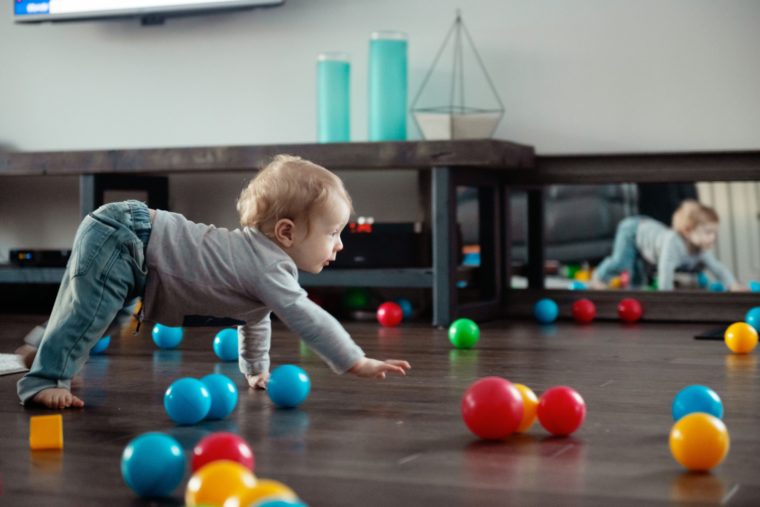Your baby has reached an important transitional stage filled with cognitive, physical, and emotional changes. Here’s what to look out for in your 11-month-old baby’s development.
What to expect at 11 months
Here’s what to expect in each developmental area for 11-month-old babies.
Physical area
Your baby will be laser focused on building hand coordination. Although hand coordination is a physical milestone, it is also a way for your baby to cognitively grasp the concept of cause and effect. Essentially, your baby is starting to understand that their actions have consequences.
This might explain why your baby loves starting and stopping the movement of objects. For example, you might notice that when your child is playing with toys with wheels, like cars or trains, they repeatedly move the toy back and forth. They might also love playing with door and drawer handles and opening and closing them repeatedly. This is your baby’s way of exploring cause and effect!
Your little one is also getting better and better at controlling their body’s movement. They can crawl faster and further and might even try to climb on furniture (this is great practice for standing up!). It’s possible that your baby will take their first steps at 11 months, but every baby develops at their own unique pace.
Get a personalized daily activity plan with fun activities adapted to your baby’s age and needs.
Cognitive area
At 11 months old, your baby will likely start showing an interest in music. Don’t be surprised if you see them bopping and moving to the rhythm of a song!
Around this time, your child will also learn about opposing concepts such as “empty and full” (e.g., filling a glass until the water runs out) and grow their language skills even further. At 11 months, your baby will be able to communicate with gestures and start understanding the meaning of words, so it is important to talk to them while playing and spending time together.
Social and emotional area
Your 11 month-old baby may be shy or anxious around strangers. This happens because they are able to differentiate between familiar and unfamiliar situations. This is normal, because at 11 months children are usually able to recognize people.
At this stage, it’s also normal for babies to be afraid of the dark, thunder, or strange sounds. If your child is scared, it’s important that you are close by to provide support and security.
Another behavior to look out for is pointing. Pointing at things means that your 11-month-old baby is looking for new ways to communicate with you and try to share their experiences. Talking with your baby and asking them about what they see is a great way to incorporate serve-and-return interactions into your everyday life.
Download Kinedu for free and start boosting your baby’s development!
Ideas to support your 11-month-old baby’s development
- Language comprehension. At this stage, your child is starting to understand what you’re saying. Describing what you are doing and giving details is a great way to support their linguistic development. This will help them learn words related to their routine and know what to expect in certain situations. Another suggestion that might help you strengthen your baby’s language comprehension is to “name” what they are doing. For example, “You are moving your foot.”
- Introducing solid foods. Your child loves making choices about what they will or will not eat. Because food choices are a way for your child to asset their autonomy, there will be times when they will reject the food that they loved one day before. Try having 3 or 4 food options so that your child can feel good about whatever they choose.
- First steps. To help your 11-month-old baby develop their gross motor skills safely, set up a space at home where they can practice crawling and walking. Line up several toys that catch their attention so that they can move to grab them.
- Motor skills. To reinforce your baby’s hand movements, hand them a ball so they can throw it or give them a rattle to shake. This will strengthen their hand muscles and lay the foundation for future writing skills.
- Memory. When you see your 11-month-old baby doing something over and over again, it means they are trying to understand how a certain object works. This also boosts your child’s ability to memorize. You can help them explore objects that catch their eye and encourage them to use them. For example, if they see building blocks, encourage them to try building a tower.
- Emotional development. At this stage, it is normal for your little one to experience separation anxiety. If they cry every time they don’t see you or when you leave the room, it’s important to show them that you will indeed come back. To help teach the concept of object permanence, trying hiding and revealing an object. This will help your child understand that things continue to exist even if they’re out of sight. It can also help to continue speaking to your baby when you move around, whether you go into the next room or step away for a moment. That will help them understand that even if they don’t see you, you are still there with them.
Remember that every child develops at their own pace. Your role as a parent is to bond with them, and help them feel supported at every stage.
Download Kinedu for free and start boosting your baby’s development!
To continue learning how to monitor and support your 11-month-old baby’s development download Kinedu for FREE!








